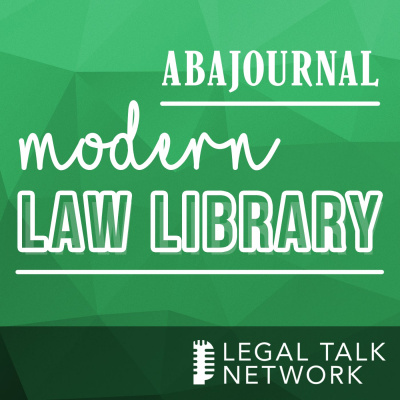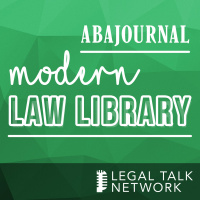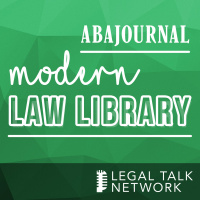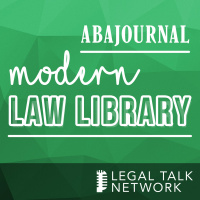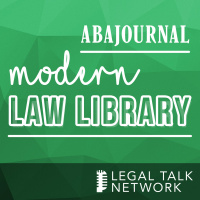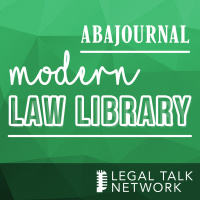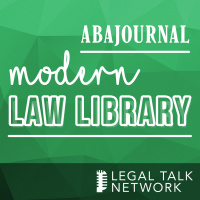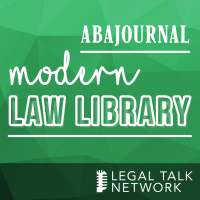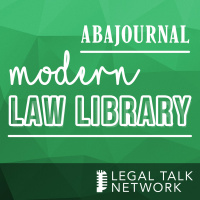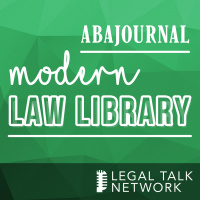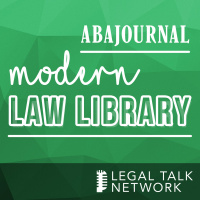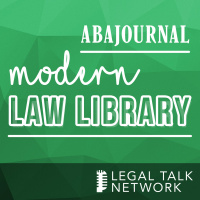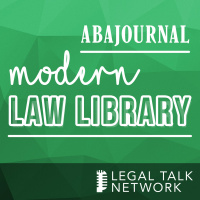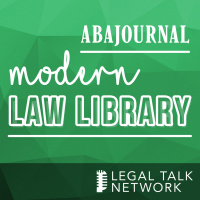Aba Journal: Modern Law Library
- Author: Vários
- Narrator: Vários
- Publisher: Podcast
- Duration: 74:02:32
- More information
Informações:
Synopsis
Listen to the ABA Journal Podcast for analysis and hear discussions with authors for The Modern Law Library books podcast series.
Episodes
-
The Crime of Complicity: Examining the Role of the Bystander in the Holocaust and Beyond
03/05/2017 Duration: 23minIf you are a bystander and witness a crime, should intervention to prevent that crime be a legal obligation? Or is moral responsibility enough? These are among the hard-hitting questions discussed in a provocative and moving conversation with author and Holocaust education advocate Amos N. Guiora. In his new book, "The Crime of Complicity: The Bystander in the Holocaust," Guiora addresses these profoundly important questions and the bystander-victim relationship from a deeply personal and legal perspective, focusing on the Holocaust and then exploring cases in contemporary society. Sharing the experiences of his parents, who were Holocaust survivors, and his grandparents, who did not survive, Guiora examines the bystander during three distinct events: death marches, the German occupation of Holland, and the German occupation of Hungary. He then brings the issue of intervention into current perspective, discussing sexual assault cases at Vanderbilt and Stanford Universities, as well as the plight of today’s
-
Are prisoners’ civil rights being needlessly violated by long-term solitary confinement?
19/04/2017 Duration: 31minIn the 1960s and 1970s, a series of deadly prison riots convinced corrections officials that long-term solitary confinement was the only solution to control the “worst of the worst.” Supermax prisons, such as the Pelican Bay State Prison in California, were constructed to fulfill this perceived need. But with the abundance of evidence showing how psychologically harmful solitary confinement is, can its use be justified? And with the lack of transparency surrounding the number and type of prisoners being held in long-term solitary confinement, how can we really judge its necessity or effectiveness? In this episode of the Modern Law Library, the ABA Journal’s Lee Rawles speaks with Keramet Reiter, a University of California Irvine professor and the author of the new book 23/7: Pelican Bay Prison and the Rise of Long-Term Solitary Confinement. Reiter discusses the years of research she conducted into Pelican Bay Prison, including interviews with the prison’s main designer; the judge who condemned horrific abuse
-
What can neuroscience tell us about crime?
15/03/2017 Duration: 19minNeuroscience and brain-imaging technology have come a long way, but are they actually useful in a courtroom setting to explain why a person committed a crime? And are our brains to blame for all our actions, or do we have free will? Can a differently shaped brain remove moral responsibility for violence in an otherwise functioning person? In this episode of the Modern Law Library, the ABA Journal's Lee Rawles spoke to Kevin Davis, a fellow ABA Journal editor and author of the new book "The Brain Defense: Murder in Manhattan and the Dawn of Neuroscience in America's Courtrooms." Davis shares how he first became interested in the issue of brain injury and brain development theories as evidence, and explains the little-known backstory to the murder case that ushered in the use of neuroscience in criminal defense cases. He also recounts the way the reporting for this book ended up changing his own attitudes and behavior–and how he parents his son.
-
Al-Tounsi by Anton Piatigorsky: The U.S. Supreme Court through a Human Lens
07/03/2017 Duration: 27minIn his debut novel Al-Tounsi, critically acclaimed Canadian-American author and playwright Anton Piatigorsky tells the behind-the-scenes story of U.S. Supreme Court justices as they consider a landmark case involving the rights of detainees held in a Guantanamo Bay-like overseas military base. It explores how the personal lives, career rivalries, and political sympathies of these legal titans blend with their philosophies to create the most important legal decisions of our time. Given the current U.S. political climate, Al-Tounsi could not be more topical or relevant. In a conversation that touches on everything from the right of habeas corpus to similarities between the fictional justices and their real-life counterparts and differences between the U.S. and Canadian Supreme Courts, Jon Malysiak, Director of Ankerwycke Books, discusses the novel with Piatigorsky. They explore how the author, born and educated in the U.S. and currently living in Toronto, came to write a novel with so many parallels to curren
-
Legal Asylum by Paul Goldstein: A Satiric Look at Legal Academia
01/02/2017 Duration: 20minIn his new novel, "Legal Asylum: A Comedy," bestselling and Harper Lee Prize-winning author Paul Goldstein takes a satiric – and affectionate – look at the lengths to which the dean of a backwater state law school will go to ensure that her school makes it into the annual U.S. News & World Report Top Five. With the simultaneous arrival on campus of an American Bar Association committee to conduct the law school’s reaccreditation review, "Legal Asylum" asks: Can a school make it into the exalted realm of the U.S. News Top Five and lose its accreditation, all in the same year? In a wide-ranging conversation, Jon Malysiak, the Director of Ankerwycke Books (the trade imprint of ABA Publishing), explores with Goldstein how fiction follows truth and the rankings game can produce a law school at which law teachers (at least those who manage to make it into the classroom) teach no law, a timid associate dean discovers a secret agenda that surprises even him, and a mailroom clerk may hold the school's future in his h
-
Alberto Gonzales reflects back on Bush administration and gives his advice for Trump staff
18/01/2017 Duration: 30minThe Hon. Alberto R. Gonzales rose from humble beginnings in Humble, Texas, to some of the highest legal positions in the country as White House counsel and U.S. attorney general under President George W. Bush. As the nation prepares to inaugurate a new presidential administration, the ABA Journal's Lee Rawles spoke with him about his new memoir, "True Faith and Allegiance," his reflections about the choices the Bush administration made during his own time in office, and his advice for President-elect Donald Trump's nominees. He also sheds light on how some of the post-9/11 legal decisions were made and what it meant to him to be the first Hispanic person to advise the president of the United States as his chief counsel.
-
Was this lawyer-turned-WWII-spy the basis for James Bond?
21/12/2016 Duration: 19minIn a different time, Dusko Popov might have enjoyed the life of a Serbian playboy without the interruption of espionage, subterfuge and violence. But from the early days of World War II, Popov risked his life as a double agent to aid the Allies in the fight against the Nazis. Florida attorney Larry Loftis had been intending to write a fictional spy novel, he tells the ABA Journal's Lee Rawles in this episode of the Modern Law Library. But in researching the lives of spies in World War II, he discovered Popov's story and decided that this was a truth no fiction could touch. Loftis combed U.S., British, Portuguese and German archives and Popov's own memoirs—and interviewed surviving members of Popov's own family—to produce "Into the Lion's Mouth: The True Story of Dusko Popov: World War II Spy, Patriot, and the Real-Life Inspiration for James Bond." In this podcast, Loftis discusses how he came to learn of Popov; how the paths of Bond creator Ian Fleming and Popov may have crossed; and why Popov was convinced
-
What can past presidential history teach us about today?
16/11/2016 Duration: 30minThe law is not Dallas attorney Talmage Boston's only love. "I have had a lifelong fascination with the presidency since I was 7 years old, and in recent years have become increasingly fascinated with it, given that so many of our top historians and non-fiction writers are devoting themselves to writing presidential biographies or studying the presidencies of different leaders over the years," Boston says. Boston made it his mission to conduct interviews with many of these well-known historians in front of live audiences, focusing the interviews on 20 historically significant presidencies. The edited transcripts of those interviews are compiled in his new book, “Cross-Examining History: A Lawyer Gets Answers from the Experts About Our Presidents.” In honor of the 2016 election, Boston joins the ABA Journal's Lee Rawles for this episode of The Modern Law Library. He talks about this labor of love, the importance of considering historical context when judging a president's actions, and what past history may
-
John Lennon's lawyer explains how the musician's deportation case changed immigration law
19/10/2016 Duration: 11minWhen immigration attorney Leon Wildes got a call from an old law school classmate in January 1972 about representing a musician and his wife who were facing deportation, their names didn’t ring a bell. Even after meeting with them privately at their New York City apartment, Wildes wasn’t entirely clear about who his potential clients were. He told his wife that he’d met with a Jack Lemon and Yoko Moto. “Wait a minute, Leon,” his wife Ruth said to him. “Do you mean John Lennon and Yoko Ono?” What Wildes didn’t know when accepting the Lennons’ case was that he and his clients were facing a five-year legal battle which would eventually expose corruption at the highest levels of the Nixon administration and change the U.S. immigration process forever. His account of that legal battle is told in John Lennon vs. the USA: The Inside Story of the Most Bitterly Contested and Influential Deportation Case in United States History. Leon Wildes and his son Michael (now a managing partner at the firm his father founded,
-
A seismic shift in how the US wages war and what it means for the American public
21/09/2016 Duration: 35minWhat is war? Is it a state that is entirely distinct from peace? Has it changed over the years to become something else? In this episode of the Modern Law Library, Georgetown law professor Rosa Books shares the experiences she had in the U.S. government which led her to write her new book, “How Everything Became War and the Military Became Everything: Tales from the Pentagon.” Brooks discusses the post-9/11 changes that shifted the thinking of both the military and the legal community when it came to the laws of war, particularly drone warfare. The military has been the recipient of both more funds and weightier expectations, as it’s called upon to perform tasks which traditionally would have been the province of civilian government and the diplomatic corps. As a state of non-traditional warfare seems to have become a permanent fixture, does the traditional divide between civilian and military justice still make sense? And how can the American public hold the government accountable when an increasing amount
-
Freedom isn't the end of the story for exonerees
17/08/2016 Duration: 31minWhen we hear about the wrongfully convicted, media coverage usually ends with the person being released from prison or reaching a large settlement with the state. But for the exonerated, life goes on–lives for which prison did not prepare them. Often they’re stymied by red tape which keeps them from finding employment or housing. The families they left behind may be almost unrecognizable to them. Technology which is commonplace now—such as cell phones—may have been completely absent when they went to prison. Journalist Alison Flowers has made the post-prison lives of exonerees the topic of her new book, "Exoneree Diaries: The Fight for Innocence, Independence and Identity." She profiled four Illinois exonerees in the book, following them for months and years as they adjusted, or failed to adjust, to life outside prison walls. In this episode of the Modern Law Library, she discusses with the ABA Journal’s Lee Rawles the experience of writing the book, the issues facing exonorees, and what efforts have been ma
-
How a 1980s lynching case helped bring down the Klan
13/07/2016 Duration: 12minOn the morning of March 21, 1981, the body of 19-year-old Michael Donald was found hanging from a tree in Mobile, Alabama. The years that followed saw the conviction of his two killers and a civil case brought by Donald's mother which bankrupted the largest Klan organization in the United States. In this episode of The Modern Law Library, we speak with Laurence Leamer about his new book on the case, The Lynching: The Epic Courtroom Battle that Brought Down the Klan. He shares details about how and why Donald was killed, what became of his killers, and how the case also brought Morris Dees and the Southern Poverty Law Center into greater national prominence.
-
In ‘The Last Good Girl,’ Allison Leotta tackles the fraught subject of campus rape
22/06/2016 Duration: 15minAuthor Allison Leotta has used her 12-year experience as a federal sex-crimes prosecutor in Washington, D.C., to bring real-world issues into her fiction. Leotta has written five novels chronicling the adventures of her protagonist, prosecutor Anna Curtis. The most recent, The Last Good Girl, takes on the issue of campus sexual assault at a fictional private college in Michigan. The ABA Journal's Lee Rawles spoke with Leotta about how she shifted her career from lawyer to author; why the issue of campus sexual assault is so timely; and what's next for her intrepid heroine Anna Curtis.
-
Before stop-and-frisk there were vagrancy laws; ‘Vagrant Nation’ explores their rise and fall
11/05/2016 Duration: 23minFrom the 18th century through the beginning of the 1970s, American officials had an incredibly versatile weapon to use against anyone seen as dangerous to society or as flouting societal norms: vagrancy laws. To be charged with vagrancy did not require an illegal action; vagrancy was a status crime, says professor Risa Goluboff. You could lawfully be arrested, charged, and convicted because of who police thought you were, not what you'd done. During the post-WWII era of tumultuous social change, these laws were used against civil rights leaders, beatniks, hippies, interracial couples, suspected Communists, homosexuals, prostitutes, and–above all–the poor and politically vulnerable. In this episode of the Modern Law Library, the ABA Journal's Lee Rawles speaks with Risa Goluboff about her new book, Vagrant Nation: Police Power, Constitutional Change, and the Making of the 1960s, to find out how these laws came about; how they were used in practice; and what it took to finally bring these laws down.
-
Prosecutor's book offers first-hand look at 'Making a Murderer' subject Steven Avery
22/03/2016 Duration: 25minA year before Netflix's viral hit Making of a Murderer was making headlines, Manitowoc County prosecutor Michael Griesbach released his book The Innocent Killer: A True Story of a Wrongful Conviction and its Astonishing Aftermath. Griesbach was the prosecutor who worked to free Steven Avery after DNA evidence proved he had been wrongfully convicted of a terrible assault. In this episode of the Modern Law Library, we speak with Griesbach about his work to achieve Avery's exoneration; why he decided to write a book on the topic; whether watching Making a Murderer changed his mind about Avery's guilt in the murder of Teresa Halbach; some of the evidence the documentary left out; and how the release of the Netflix documentary has affected Manitowoc County.
-
Harper Lee Prize winner tells how history and race shaped her Southern gothic novel
21/12/2015 Duration: 22minThe Secret of Magic is a book within a book. It is both the title of Deborah Johnson’s 2015 Harper Lee Prize for Legal Fiction-winning novel, and (in the world of that novel) a reclusive writer’s scandalous 1920s children’s book, which dared to feature black and white playmates solving mysteries together in a magical forest. The protagonist of The Secret of Magic, Regina Robichard, is a young black lawyer in 1946, working for Thurgood Marshall and the NAACP Legal Defense Fund. Raised in the north, Regina travels to Mississippi for the first time to investigate the mysterious death of a returning World War II veteran. She discovers that she has been summoned by the reclusive author M. P. Calhoun, a white woman who wrote a single inflammatory book–The Secret of Magic–and has never published again. What Regina uncovers in the small southern town of Revere is a morass of conflicting social and racial ties, in which the real mystery is not who killed the young black soldier–but whether justice of any type will be
-
Linda Fairstein chats about her Alex Cooper series--and reveals an exciting new project
26/08/2015 Duration: 24minIn the hands of author Linda Fairstein, fictional sex-crimes prosecutor Alex Cooper has enjoyed a career spanning 17 books and almost two decades. Cooper's 16th adventure, Terminal City, was selected as one of the three finalists for the 2015 Harper Lee Prize for Legal Fiction. Fairstein spoke with the ABA Journal's Lee Rawles to discuss Terminal City and Devil's Bridge, the newly released 17th book in the Alex Cooper series. She also shared some exciting news about a brand new project she has in the works.
-
Grammar nerds, meet your Comma Queen
30/04/2015 Duration: 16minMary Norris has been a copy editor for the New Yorker since 1978. In her new book, Between You & Me: Confessions of a Comma Queen, she offers clear and understandable grammar lessons for some of the most common conundrums faced by English speakers. Along the way, she also lifts the veil on the editorial process for the famed magazine, and describes the meandering career path that led her to the New Yorker. In this episode of the Modern Law Library, Norris and the ABA Journal's Lee Rawles discuss lawyers' affinity for language, and the behind-the-scenes challenges involved in magazine editing.
-
Author tells tangled tale of the $19B verdict against Chevron in 'Law of the Jungle'
28/01/2015 Duration: 20minIn 2011, an Ecuadoran court found the Chevron Corporation liable for environmental damage caused by oil drilling in the 1970s-80s. Chevron was ordered to pay $19 billion to the plaintiffs who brought the suit, a collection of small farmers and indigenous peoples. Although it is tempting to fit this into a simple narrative-either "victory for oppressed people against an evil corporation" or "responsible corporation preyed upon by voracious plaintiffs attorneys"--the truth just isn't that simple. And the $19 billion verdict was far from the end of this story. Modern Law Library moderator Lee Rawles speaks with Paul M. Barrett, author of Law of the Jungle: The $19 Billion Legal Battle Over Oil in the Rain Forest and the Lawyer Who’d Stop at Nothing to Win, about the tangled backstory to one of the biggest verdicts in history.
-
All is not as it seems for 9th Circuit clerk in ATL founder's new novel (podcast)
17/12/2014 Duration: 16minIn this episode of the Modern Law Library, moderator Lee Rawles chats with Above the Law's David Lat about his novel Supreme Ambitions, his career, and his time as the anonymous author of the sometimes-scandalous blog Underneath Their Robes.
